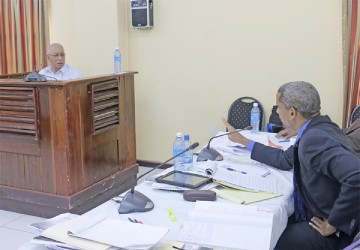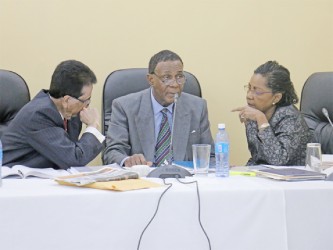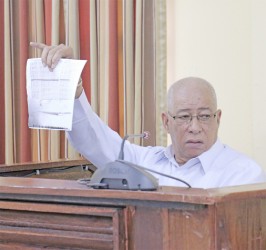Although denying he “washed his hands” of the probe into Dr Walter Rodney’s death, former Chief of Staff of the Guyana Defence Force (GDF) Major General (rtd) Norman McLean yesterday testified that he knew nothing of the investigation and said that he was even unaware of reports that an army plane transported main suspect Gregory Smith into Kwakwani.
Taking the stand before members of the Commission of Inquiry (CoI) into the death of Rodney, McLean said that even though he knew questions were being asked about Smith’s involvement, he personally did no investigation on the former soldier turned deserter.

He told an almost packed room at the Supreme Court Law Library that the first time he heard of a plane transporting Smith to Kwakwani one day after the murder was last week, when Captain Gerry Gouveia told him he was subpoenaed to testify about “the plane” at the CoI. Observers point out that such reports have been in existence since 1980.
Barbadian attorney Andrew Pilgrim, who is looking after the interest of Rodney’s widow, Patricia Rodney, and her family, asked McLean whether he would have asked Gouveia about “the plane.”
“No, sir. Having not told me for 34 years, I don’t want to know,” he said. He had earlier said that Gouveia was a product of the Guyana National Service (GNS), of which he was Director General before his appointment as Chief of Staff. He said if Gouveia had flown Smith to Kwakwani, he would have expected to be informed by him.
Earlier, he had testified that he knew of no army base at Kwakwani and that at the time there were 14 planes in the army and the air corps had a commander in charge.
While he knew there was an investigation into Rodney’s death, McLean said this was led by the Guyana Police Force. He added that there were two officers in the army, including the now deceased Godwin McPherson, who liaised with the force but he noted that he did not find out about the process as it was not his responsibility.
He did not accept that he “washed his hands” of the investigation but maintained it was the police’s responsibility and even though a former member of the GDF was being named as the main suspect he did not further inquire.
Throughout the day he appeared at ease during his testimony and even had the room erupting in steady laughter with his clever responses, so much so that Commissioner Seenath Jairam at one point observed that he was very “lyrical” in his testimony. However, the ‘cool operator’ did eventually become flustered when being questioned by Pilgrim, whose line of questioning was very aggressive and prompted CoI Chairman Sir Richard Cheltenham to caution him to ‘tone’ it down.
“All of a sudden you seem to no longer be with us,” the Chairman also told McLean, after the former Chief of Staff became more and more hesitant in answering the questions posed by Pilgrim.
“You have something to hide from this commission?” asked Pilgrim
“For what!” an angered McLean shouted, repeating himself as Pilgrim continued with the question.
Pilgrim, who prior to this had observed that “all the show done, bring the show now,” persisted with questioning McLean about whether he had something to hide from the commission, even after the chairman observed that it was not a fair question.
“I take objection to the question,” McLean further answered.
“You can take objection to what you like, it is a direct question,” Pilgrim insisted.
The lawyer said he found it strange that McLean never heard of an army plane transporting Smith to Kwakwani, since even “down in Barbados we heard that.”

McLean was also asked if he did not have a responsibility to the people of Guyana to investigate whether someone who was once in the army may have been responsible for the death of a civilian but McLean said he did not share this view.
As Pilgrim continued to seek answers, McLean was very resistant and at one point the lawyer noted that the witness was “sucking his teeth and looking about this place” without answering. He also told the witness that he “don’t always get nice questions” even as McLean told him rudely that he should ask the police about the investigation.
“I am suggesting to you sir that you deliberately turned a blind eye to the investigation and its circumstances,” posited Chairman Cheltenham at that point.
“No sir,” answered McLean.
On more than one occasion Pilgrim referred to McLean as Major instead of Major-General and he was corrected on all occasions by McLean. His last reference was made when he said ‘This is all my questions for the Major,” to which McLean said “Major-General. I have earned it!”
Deserter
Speaking about Smith, McLean accepted that shortly after Rodney’s death he did tell members of the press that no Gregory Smith was a member of the GDF and this was done after he would have asked the relevant officer-the now dead Major Alan John Lewis-to check the records.
However, after he was contacted again and given the service number 41/41, it was later revealed to him that indeed a William Gregory Smith was a member of the maritime division of the GDF but that he had deserted.
He could not recall if he had publicly stated that Smith was indeed a member of the force at one time and he is not aware that he told the press that he could not further speak on the issue unless directed by then Prime Minister Forbes Burnham, who was the then Minister of National Intelligence. And even with the interest shown in Smith and him being fingered in the death of Rodney, McLean said he was not inclined to take a look at his personal file or to find out more about him nor did he actively try to find him. He pointed out that there was a chain of command and he would have asked officers to look it. As he put it, the army at that time had 8,000 members and he did not even know all of his 300 officers.
Counsel to the Com-mission Glen Hanoman attempted to tender a document that supposedly showed Smith was being paid by the army but McLean said the document was “cut and paste and not an original” even though the lawyer maintained it was from a bound volume supplied by the army and that an officer would come and testify to its veracity.
Even so, the document was dated before McLean joined the army and the commission chairman pointed out that it was not appropriate to ask the witness about documents before his time.
He also did not have weekly or daily meetings with Burnham but rather it was monthly, when the Defence Board met.
“That was it,” he said emphatically, before adding that many of the officers who would have been around then are now dead and that he was a “fossil.”
He said he assumed the police would have been handed all information on Smith.
During his evidence-in-chief, McLean was also shown a document titled the ‘Account Form,’ which apparently logged arms transferred from the army to the notorious House of Israel through the People’s National Congress (PNC). It was purported to be signed by Godwin McPherson. While he said he could not confirm or deny whether such a form was used in the army, McLean emphatically said the signature was not that of McPherson, which he would have seen many times during his time in the army and which he knew well. He even suggested that expert assistance should be sought to verify the signature.
He also said he does not see the army transferring weapons to non-military organisations and that he would not have allowed such a transfer.
In answer to Commissioner Jacqueline Samuels-Brown, McLean confirmed that neither the PNC nor the House of Israel were affiliates of the army. He maintained that he did not collaborate in the sharing of weapons and that it would have been inappropriate to share weapons with the House of Israel.
Former House of Israel priest Joseph Hamilton, who is now a parliamentarian for the ruling PPP/C, had testified that the PNC armed the House of Israel with guns.
‘Not this boy’
McLean, who could be considered the most important witness so far to take the stand before the commission, was himself subpoenaed to testify. However, the decision to call him, presumably to get some insight into Rodney’s death or the mood of the country since he was the head of the army at the time, may have been an overly hopeful one. McLean made it known to the commission’s counsel Hanoman that he was not happy with being subpoenaed when no one even had a conversation with him.
He did, however, use the platform to make it clear that he had at no time pledged allegiance to the PNC, which was the then governing party, or former Prime Minister Burnham, who had appointed him to head the army.
“Not this boy, sir,” he quickly responded when asked by Commissioner Samuels-Brown if it was not true that he and another officer had pledged allegiance to the PNC.
McLean also used his time to speak about the virtues of the GNS, saying that heading that agency was one of the most satisfying experiences of his life. At one point, he indicated that hands would start popping up if he were to ask for a show of hands of those who would have meaningfully benefited from the GNS and even before he completed the statement many hands were raised.
Being led in his evidence by Hanoman, McLean confirmed that he was Director General of the GNS when he was appointed Chief of Staff of the army in 1979—a position he held for 11 years. Before the GNS. He was a member of the police force from which he was seconded.
In response to a question, he said he could “assume” that Burnham was instrumental in his appointment. He could not recall speaking to Burnham before being appointed but rather only after he was appointed.
Asked if Burnham would have been happy with his performance, McLean quipped: “I can call him back and find out,” much to the amusement of the audience.
“Could you call him?” responded Hanoman.
While he was “pleasantly surprised” at the appointment, McLean said he understands that at the time the office of the PNC General Secretary was burnt down but he did not connect his appointment to that incident.
He said he does not know the reason for his appointment but noted that the previous head of the army was two years over the retirement age. He admitted, though, that other senior officers had to be moved to facilitate his appointment, including an officer by the name of Pilgrim, who naturally stood in line at the time to become the head. He admitted that the officers were not happy when he took over the helm and his first active day of duty was greeted with a bomb scare.

Also at the time soldiers were very disgruntled and were deserting the army to the point that the army started actively looking for the deserters and offering them amnesty from prosecution should they return. There were many reasons for this, including the poor quality of food given, the low salary and all in all they were not being treated properly, he said. He also recalled that one of the first camps he visited was Camp Groomes, where he found that soldiers were being housed in crates that were used to import weapons. By the end of the 11 years at the helm, McLean said, he would have done an “excellent job” in making the army a better institution for its members.
McLean also said that when he took over the army he made it clear that soldiers were not going to be involved in the fetching of ballot boxes but rather they would provide protection for persons fetching those boxes. He said he would not have tolerated such an exercise and he made it clear. The GDF, he said in answer to questions, knew nothing about party paramountcy as it relates to the PNC but rather it was about the strength of its leadership and professionalism.
During his time as head of the GNS, there were 5,000 young people in the service and McLean said he makes “no apology” for training them to become disciplined, which was done in military-style. Asked what the aim of the service was, he said it was to “Develop the new Guyana man.” This was done by training the young people between the ages of 16 and 25 in loyalty and love for their country and teaching them about the hinterland.
Following questions, he spoke of his close association with then Crime Chief Cecil Alexander Roberts, better known as ‘Skip’ Roberts as the two joined the force together.
“Is this a fan club exercise?” asked attorney Basil Williams, who is watching the interest of the PNC in the inquiry, as McLean continued to speak about Roberts.
The CoI was set up to probe the death of Rodney, the co-leader of the WPA, who was killed after a walkie-talkie given to him exploded on June 13, 1980. The then ruling PNC has long been accused of his murder but has continued to reject any responsibility for the killing. Rodney had been a campaigner against the abuses of the PNC’s government but McLean noted yesterday that as he rose to prominence he could have been seen as a thorn in the sides of the PNC and PPP parties.
The commission is also tasked with specifically enquiring into the cause of the explosion in which Rodney died, including whether it was an act of terrorism and if so who were the perpetrators.




